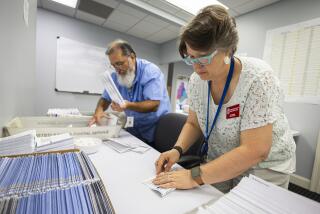No More Chads: Voting by Touch Screen Hits Florida
- Share via
CALLAHAN, Fla. — Voters in this small town on Tuesday became the first in Florida to use touch-screen voting machines, which many counties are considering as the state rids itself of the punch-card ballots that hung up the 2000 presidential election.
“No more hanging, dimpled or pregnant chads,” Lt. Gov. Frank Brogan said after getting a demonstration of the machines in the town in northern Florida’s Nassau County. “It’s very impressive.”
Tuesday’s election in the town of 527 registered voters, out of a population of 946, was for three of its four town council members.
“I like it,” 72-year-old voter Rosa Lee Thomas said of the machines. “It’s an easier way for me to vote.”
In future elections statewide, Florida voters will have to use either the touch screen or optical scanning machines.
Punch cards were banned because of their role in the recounts and court fights after last fall’s presidential balloting.
The touch screens, similar to automated teller machines, will not let voters cast more than one vote in each race. They will let voters skip a race but will ask them if they know they did that.
The machines also can read a ballot to blind voters.
Election Systems and Software of Omaha is the only company now certified by the state to sell touch-screen machines. ES&S; offered Callahan free use of the technology for Tuesday’s election, said Vicki Peterson Cannon, Nassau County’s supervisor of elections.
Buying enough of the machines for Nassau County’s 38,000 registered voters would cost about $700,000.
Touch screens have been in use for several years in Greensboro, N.C., and have seen some use in Dallas, said Dan McGinnis, vice president of sales for ES&S.; Florida’s Pasco County, north of Tampa, has contracted with ES&S; to begin a move to touch screens.
The touch screens are more expensive than the optical scanning systems--similar to those used to score standardized school tests--but they could save money in big counties by eliminating the cost of printing and storing paper ballots.
More to Read
Sign up for Essential California
The most important California stories and recommendations in your inbox every morning.
You may occasionally receive promotional content from the Los Angeles Times.













